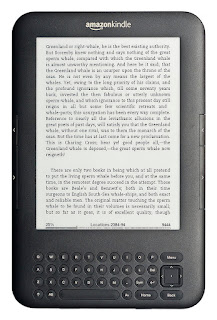 |
| By NotFromUtrecht - Own work, CC BY-SA 3.0, https://commons.wikimedia.org/w/index.php?curid=11658040 |
There is still a need for e-readers despite the rise of tablets. While both e-readers and tablets can be used for reading e-books, they have distinct differences that make each device suitable for different purposes.
Here are some reasons why e-readers are still relevant:
E-ink Display: E-readers typically use e-ink displays, which simulate the appearance of ink on paper. This technology reduces eye strain and provides a reading experience that closely resembles reading from a physical book. E-ink displays also have excellent battery life, allowing users to read for days or even weeks on a single charge.
Lightweight and Portable: E-readers are designed to be lightweight and highly portable, making them ideal for avid readers who want to carry their entire library with them. They are usually smaller and lighter than tablets, making them easier to hold for extended periods.
Reduced Distractions: E-readers are focused devices designed primarily for reading, whereas tablets offer a wide range of functionalities and distractions. Tablets often come with social media apps, games, email, and other notifications that can interrupt reading sessions. E-readers, on the other hand, are dedicated devices that prioritize the reading experience, allowing users to concentrate on their books without interruptions.
Improved Reading Experience: E-readers often come with features specifically tailored for reading, such as adjustable font sizes, built-in dictionaries, highlighting and note-taking capabilities, and the ability to sync progress across devices. These features enhance the reading experience and make it easier to customize the reading environment to personal preferences.
Battery Life: E-readers have significantly longer battery life compared to tablets. Since e-ink displays only consume power when the screen changes, e-readers can last for weeks or even months on a single charge, depending on usage. This makes them more suitable for extended reading sessions, travel, or situations where access to charging points is limited.
While tablets offer more versatility with their multimedia capabilities, web browsing, and app ecosystem, e-readers remain popular among readers who prioritize a dedicated, distraction-free reading experience. Ultimately, the choice between an e-reader and a tablet depends on individual preferences and needs.
Source: Some or all of the content was generated using an AI language model

No comments:
Post a Comment
Contact The Wizard!
(he/him)